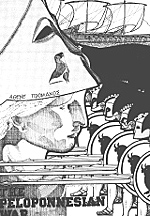
Introduction
The Peloponnesian War is a game type simulation of the war waged between Athens and Sparta and their respective allies from 431 to 404 BC for the control of the Hellenic World.
Players 2 (optional 3rd Persian player)
Period Ancients
Scale Strategic Turn Yearly/Seasonal
Map 36 kilometers per hex
Unit Mora of Hoplites or auxiliary troops (bowmen, cavalry, peltast, swordsmen, etc.); squadron of triremes
Components
Box ziploc for 1st edition; 1" cardboard for 2nd edition
1 22"x28" unmounted map on thick paper
1 12 page half-sized rulebook
255 die-cut counters
Counter Manifest (2nd edition)
48 Athenian white on black
42 Spartan black on orange
47 Major Athenian allies black on blue
28 Major Spartan allies blue on orange
9 Minor Athenian allies white on blue
23 Minor Spartan allies white on orange
SimCan says:
“The Peloponnesian War is the classic example of a land power (Sparta) and a sea power (Athens) at war with each other. Both players collect funds from controlled cities and expend those funds to mobilize combat units. Players must carefully mobilize units at the right times and the right places to be able to come to grips with their enemy. Thucydides was the main source for the game ... For the second edition we have done some major redevelopment ... a number of systems have more variability.”
The Reviewers say:
“Mr. Newberg knows the history of the Greek Wars and has done some interesting things simulating it. I found PW to be interesting, colorful (in the historic sense as well), long and exhausting.” --Bill Haggart in F&M 10.
“The summer-winter phasing of the sequence of play and the interlocking and alternating move-combat-siege systems are very effective...” --Peter Manti in F&M 22.
“Economic as well as military simulation of the famed ancient war, covering Sicily to Anatolia. Odds/ratio CRT with losses to attacker and defender, plus Morale recovery ... Moderate complexity, fairly long.” --Richard Berg in S&T 64.
Comments
The 2nd edition corrects some of the flaws from the 1st edition -- gone are the gaudy, hard to read counters, the rules are more streamlined, and certain odd situations are rectified. The map includes Byzantium, Thrace, Italy, Macedonia, Thessaly, Anatolia, Sicily, and other ancient favorites. Revolts, naval building, and leaders are included.
Collectors Notes
Being one of SimCan’s best, this title has remained steadily priced in the $40+ range for an unpunched copy. The 1st edition ziploc is hard to find, but the boxed 2nd edition is the better game, generally regarded as a potential classic. Main competition is Mark Herman’s excellent effort for Victory Games. Boone lists low, high and average costs of 4/27/15.20 at auction and 12/24/ 19.50 for sale (edition unspecified).
Errata
.The Treasury Tracks were not printed on the map. Two lines of adjacent boxes numbered 0 to 9 may be created. .On the Unit Color Code Chart, all references to purple should have said black. .On the map, the island containing Mytilene is Lesbos, and Thebes should mobilize 2C instead of the listed 2S.
Steve Newberg says:
This game was an outgrowth of my Master thesis work from when I was still in the military. Athens and Sparta, at first glance, display the classic confrontation between a democracy and a dictatorship, a seapower and a land power. An ideal, and often-touted direct analogy to the modern standoff between the United States and Soviet Russia during the Cold War. So the pundits (and some of my course material) said, until you looked a bit deeper. The Peloponnesian War tried to show a bit of that closer examination. An Athens that totally dominated its allies abroad and really very unlike what we think of as democracy at home. A Sparta unsure of its place and trying to keep up with the greatest power of its time. So perhaps not so bad an analogy after all.
Back to Simulacrum Vol. 3 No. 2 Table of Contents
Back to Simulacrum List of Issues
Back to MagWeb Master Magazine List
© Copyright 2001 by Steambubble Graphics
This article appears in MagWeb (Magazine Web) on the Internet World Wide Web. Other military history articles and gaming articles are available at http://www.magweb.com